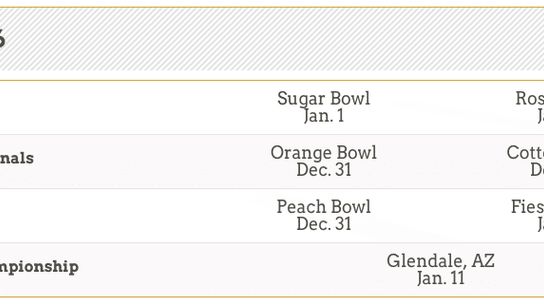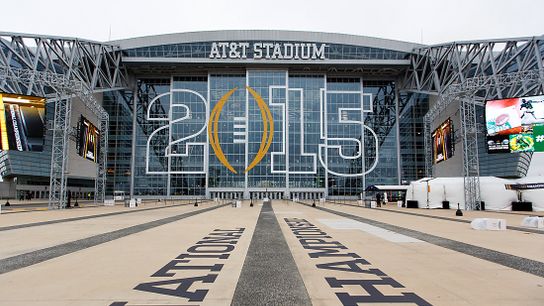The inaugural College Football Playoff was perfect. Semifinals at the Rose and Sugar bowls, the title game a week and a half later at football's most spectacular modern venue, it was the epic conclusion the greatest regular season in sports deserved - and had the ratings to prove it.
After 145 years in waiting, college football finally had its postseason figured out. Surely the new schedule will continue into perpetuity, right?
Wrong. It's never that easy with this sport.
The great underreported fact of the new College Football Playoff system is that the semifinals are only slated to be on New Year's Day every three years. Because they are God's gift to football, the Rose and Sugar bowls signed contracts with ESPN locking them into the New Year's Day evening and night time slots before the CFP came into existence. Either unable or unwilling to negotiate them out of those slots, the CFP semifinals will rotate around the Rose and Sugar bowls and not the other way around.
Here is this season's schedule, via the CFP's official website:

Playing the semifinals on New Year's Eve rather than New Year's Day has always been a terrible idea to everyone except CFP executive director Bill Hancock and the bowl executives involved. These were the same people that refused clung to the lie that a playoff would ruin the bowl system right up until the BCS's dying day. Visionary thinking isn't a collective strength.
New Year's Eve isn't the football-and-couch cultural holiday that New Year's Day is. Many businesses treat it like a regular work day. Imagine the crisis Oregon fans would have felt three weeks ago when the Rose Bowl kicked off at 2 p.m. PT while they're still at work. Similarly, picture the conflict at many households along the Eastern portion of the country when midnight strikes and the Sugar Bowl is in the beginning of the fourth quarter.
- Honey, get over here. The ball's about to drop!
- Hang on, it's 3rd-and-6!
That is the scene the College Football Playoff's leaders envisioned when they debuted the new system a year and a half ago. It's one of the things Hancock is most proud of about the new system. "It will be interesting for the next two seasons with the semifinals on New Year's Eve," Hancock told Bleacher Report. "It will absolutely change New Year's Eve in this country. When we go to New Year's Eve parties, they better have a television because we're going to have to be watching college football." Again, relying on him for visionary thinking was our fault, not his. One of the people who sees a crisis ahead is John Skipper, the most powerful man at the most powerful media company in sports. In today's Sports Business Journal, John Ourand and Michael Smith outline the pressure ESPN is putting on the CFP to move its semifinals from Thursday, Dec. 31 to Saturday, Jan. 2. "Sources say that senior network executives as high up as ESPN President John Skipper are pushing for the change as a way to get better television ratings, but the CFP is unwilling to make such a move because it is committed to the original plan to hold tripleheader bowl games, including the semifinals, on New Year’s Eve and New Year’s Day," they write. "We've started a new tradition and we don't want to back away from it now," Hancock retorted.
ESPN signed a 12-year contract paying nearly $500 million a year for rights to the CFP a little over two years ago, a fact the Worldwide Leader is likely to remind Hancock and his cohorts of in their negotiations.
According to SBJ, the Playoff is also battling on another front, and this time it's with the NFL. The league has eyed the possibility of expanding its playoffs from 12 to 14 teams for a while, and many within the media believe that expansion could come as soon as 2015. Since expanding to 12 teams in 1990, the NFL has staged its Wild Card weekend with two games on Saturday (one evening, one night) and two on Sunday (one afternoon, one evening).
There is room in the schedule to play a third game each day, but the SBJ writes the league would rather extend Wild Card weekend into Monday night, which, for next season at least, would be a direct conflict with the Jan. 11 College Football Playoff championship. "Sources say NFL Commissioner Roger Goodell initiated a series of high-level meetings with some of the CFP’s most influential commissioners, including the SEC’s Mike Slive and the Big Ten’s Jim Delany," Ourand and Smith write. "Goodell approached the commissioners to discuss the potential impact an NFL playoff expansion would have on the CFP championship game."
As foolhardy as the CFP is to cram its semifinals into New Year's Eve, it is in the right on this issue. “We picked Monday night because it was open and it was the best night for our game. We announced that in June 2012,” Hancock said. “We established that our game was going to be on Monday night for 12 years.” Expanding the playoffs is nothing more than a ploy to line its coffers with more television money.
Sunday night is the most valuable piece of real estate in television, so an extra Wild Card game in that time slot feels like a lock. The only reason the NFL would push into Monday night - and create a competitive disadvantage for the winner, with one less day to prepare for a divisional game the following weekend - would be to drive a higher price from the networks.
College football and the NFL have for decades enjoyed a symbiotic relationship as two halves of America's favorite sport. But with more money at stake than ever, and with a stated goal of driving annual revenues to $25 billion by 2027, the NFL has shown there is no toe it won't step on in its chase for a dollar.
